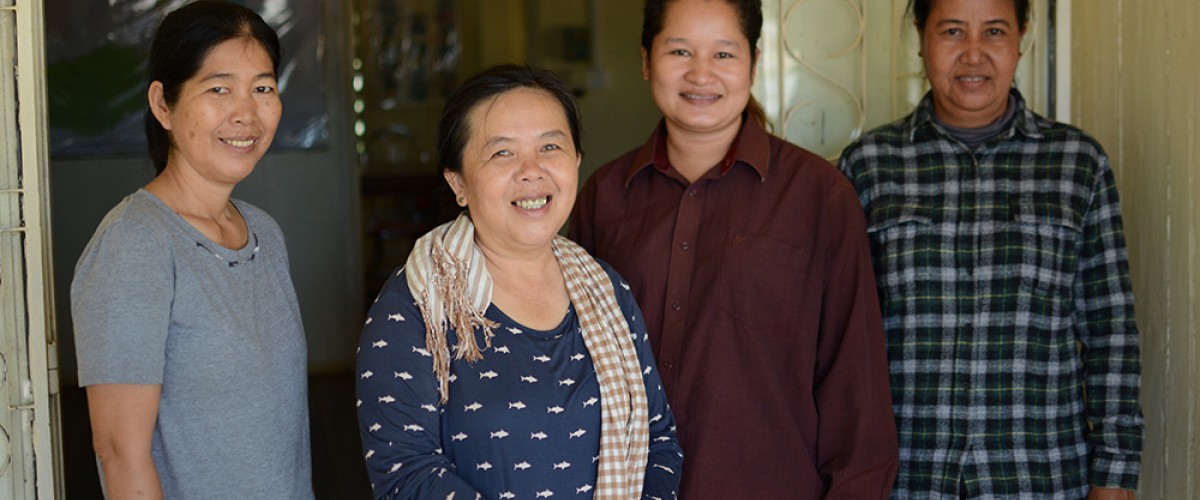Meet Phealy Kim, or Ly as she likes to be called. She’s a pint-sized woman with a heart that’s larger than life and an arm that reaches out to countless families in Pursat, Cambodia.
For the past 20 years, Ly has been HOPE’s liaison in Pursat. As one of the strongest English speakers at the Pursat office, Ly is often showing donors and visitors around the various families who have received a well. When she’s not out on the roads of Pursat, Ly can be found at the HOPE offices, organising her team, overseeing the Self Help Groups and making sure funds are coming in.
It can be easy to forget that this motivated and influential leader endured one of history’s darkest periods. This is her story:
Like many children of Cambodia, a vicious dictator authored Ly’s youth. She was only 13 when the Khmer Rouge entered Phnom Penh on April 17, 1975. Initially they were welcomed as liberators and embraced by the city, but the tyranny was just about to start. The Khmer Rouge methodically expelled city-dwellers out into the countryside to undertake forced agricultural labour. Ly, her two younger brothers, their parents, an aunty and uncle and the family grandparents were all forced to leave.
April is in the dry season, a four to five month period of extreme heat with temperatures often reaching 45 degrees Celsius. Many of those evacuated died as they walked to their new farming destinations. During the evacuation, Ly and her family were sent to Kampot, a village south east of Phnom Penh. Here they were individually categorised by work ability and sent to different farms.
Ly was separated from her family for months at a time, only given the opportunity to return once her work projects were done. After months of separation, Ly returned to Kampot and to her mother’s house. But she found it empty. Nobody knows where her parents went or what happened to them. The only answers Ly has ever received is that her Aunt and one of her brothers died from disease. The rest is completely unknown.
“It was a horrible time, a tragedy of Cambodia with so many children losing their parents.”
Ly was left to fend for herself in the shock and aftermath. She survived by attaching herself to fellow workers, men and women who she felt safe with. For three more years, this was her life. Travelling, working, trying to escape the dangers of the jungle life and find a village to live in. When the Vietnamese arrived in January 1979, the Viet Kong continued pushing the Cambodian people away from Phnom Penh and in to the jungle. Eventually Ly found Pursat, almost 200km away from Phnom Penh. It’s here that she set up her new life.
“Cambodia culture is to put pain to one side, to put it in a corner, so that you can start a new life rather than hold the pain,” she said. And that’s what she did. With the Vietnamese came the opportunity for education so in 1980, Ly returned to Phnom Penh to train as a primary nurse.
Meeting Ly, it’s easy to understand why she chose nursing.
“I dream of helping those people who suffered like me,” she said. “It’s my dream to do more, to help those people.”
She returned to Pursat in 1981 to work in the local hospital and met her husband, Pheap, in 1983. In 1991, Ly started working for a Non-Governmental Organisation (NGO) called Care International, which focused on training local women and teaching literacy. In 1995, she moved to work with HOPE.
A lot of her work in the community is with the women, because “when you help the woman, you help the entire family,” Ly explained.
“I’ve mostly dedicated my life to build the capacity of women, to help women help themselves,” she said. A majority of Ly’s work is developing relationships with the local families, so that when the well arrives she can track their progress and make sure everything is growing.
“To see the changes of those families, they have this sadness and then you see them smiling and energetic,” Ly said. “It’s a big, big gift of life for me to be able to do it.”
“The end goal is to do ourselves out of a job.”


